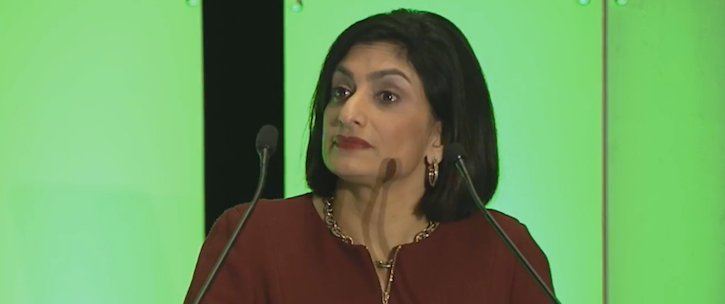Aiming for Patient Empowerment, White House Launches MyHealthEData Initiative
Announced during HIMSS 2018, the plan calls for patient access to their health records, in a push toward interoperability and value-based care.

Seema Verma, CMS administrator
The Trump administration announced today the launch of its MyHealthEData initiative, a government-wide push to free electronic health records (EHRs) from the clutches of health insurers, providing the information to patients, who may then carry it to new healthcare providers, wherever they might be. Federal officials hope it will disrupt a system that, according to one leader, has become “unsustainable.”
Ultimately, officials aim to “empower patients around a common aim: giving every American control of their data,” according to CMS, whose administrator, Seema Verma, MPH, unveiled the initiative during the first full day of HIMSS 2018 in Las Vegas, Nevada. The White House hopes to provide EHR access to patients from any device or app, enabling them to be more selective in choosing providers, “leading to greater competition and reducing costs,” according to the government.
“Today, we are calling on private health plans to join us in sharing their data with patients because enabling patients to control their Medicare data so that they can quickly obtain and share it is critical to creating more patient empowerment,” Verma said in her speech.
MyHealthEData is a response to an executive order by President Donald Trump, which enshrined the promotion of patient access to data. The White House Office of American Innovation, spearheaded by the president’s son-in-law and senior adviser, Jared Kushner, will lead the MyHealthEData initiative.
“Complete interoperability is the logical next step for healthcare,” Kushner said during a HIMSS speech this morning.
The US Department of Health & Human Services is also participating in the push. Its arms include CMS, the Office of the National Coordinator for Health Information Technology, and the National Institutes of Health. The Department of Veterans Affairs will also join the MyHealthEData effort.
In her speech, Verma described CMS’s role in these sweeping changes and its new motto: “patients over paperwork.” With that in mind, CMS announced a “complete overhaul” of the Meaningful Use and Quality Payment programs.
CMS also kicked off a Medicare tool called Blue Button 2.0, which allows the program’s 130 million beneficiaries to access and share their EHR data in a universal format, connecting their claims data to “secure applications,” providers, services, and even researchers. So, a patient may pass on prescription, treatment, and surgery information with new providers, a sea change that officials hope will cut down testing duplication, among other things. Verma said it will create an “ecosystem” that enables tech innovators to use the information to better
The agency intends to refocus its EHR incentive programs around interoperability, mandate providers to update their computer systems for better data sharing, require that hospital data follow patients after discharge, “streamline” documentation and billing guidelines so that providers have more time with patients, and fight against unnecessary medical testing.
“Patients need to be able to control their information and know that it is secure and private,” Verma said. “Having access to their medical information will help them make decisions about their care and have a better understanding of their health.”
She went on to tell a now-familiar story to digital-focused healthcare professionals and others in the health information technology orbit: the time her husband collapsed while traveling. Before returning home a week later, Verma asked her husband’s medical records—a question that puzzled doctors and left her with very little information, in paper and CD-ROM format.
“In the era of artificial intelligence, machine learning, and precision medicine, fax machines continue to be the go-to technology for providers sharing health information,” Verma said. “In many ways, EHRs have simply replaced paper siloes with electronic ones.”
This year, CMS plans to re-examine its relationships with health insurers, making it clear to them that it’s time to share data electronically with patients, she said. She also warned health systems that the days of information-blocking are over. The CMS head encouraged those who are reluctant to this change to get with the times.
She earned applause from the audience. Many in the health-tech space, of course, have advocated for patient empowerment and interoperability—but they have also grown skeptical of how the system may achieve those ends.
Only time will tell how MyHealthEData bears out. But come a decade from now, administration officials hope to look back on this day as the start of a patient empowerment movement.
“Let’s not let what began this week in Vegas to stay in Vegas,” Verma said.
Newsletter
Get the latest hospital leadership news and strategies with Chief Healthcare Executive, delivering expert insights on policy, innovation, and executive decision-making.